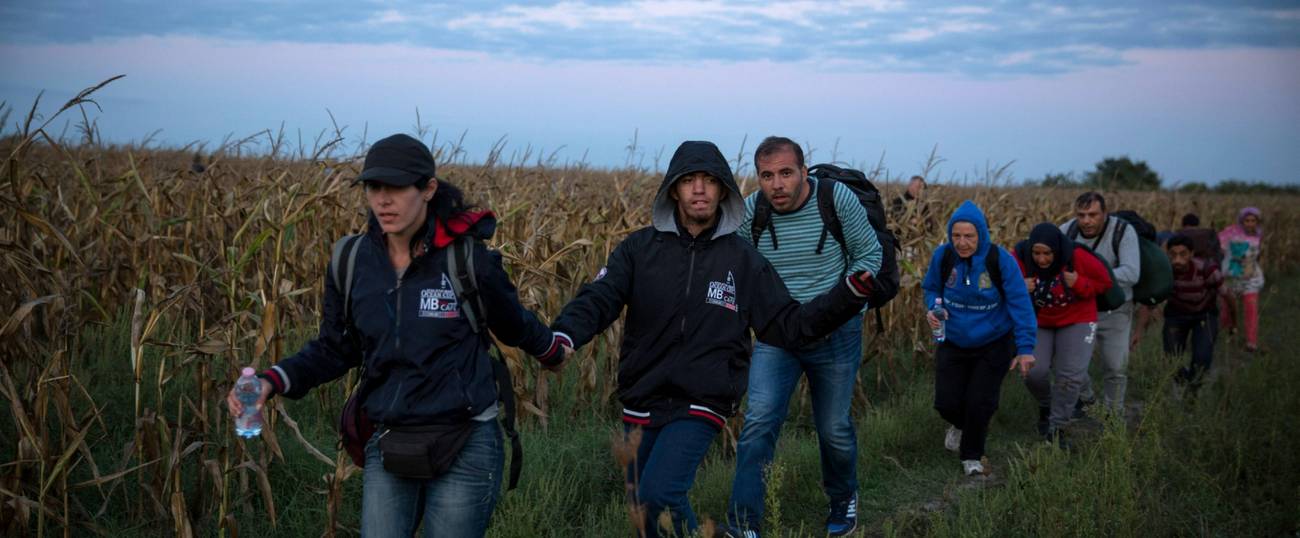Far From Home, In Need of Help—But From Where?
As millions of Syrian refugees search for safety, their dire situation is reminiscent of those who fled Nazi Germany via British kindertransports




Ora pro nobis
— A church chant, meaning “Pray for us”
I once shared a house with a man who shouldn’t have been alive. Karel Reisz, the great British-Czech filmmaker, was a kindertransport child rescued from Hitler’s Europe in the closest nick of time. In London I had several other friends who wouldn’t be alive if not for the get-up-and-go of a few humane individuals, one or two alert refugee aid committees, and, above all, British public opinion.
The amazing thing was the acquiescence of the government to permit a “swarm” of snotty-nosed kids from a foreign country to leave Europe by train and cross the channel.
It was urgent. On November 9-10, 1938, during Kristallnacht (Night of Broken Glass), the Nazis staged a violent pogrom against the Jews. That was signal enough to Britain’s conservative government which, overnight, agreed to let in kids under 17 but not with their parents. It was understood that when the “crisis” was over the kids would quickly rejoin their parents, almost all of whom the Nazis murdered.
Unprecedentedly, one morning the BBC broke into the news to ask for volunteers willing to take one or more German or Austrian children, between eight and 17, and the applications poured in. (This, when President Roosevelt refused to accept refugee kids.)
At the same time Nicholas Winton, an English banker, almost on his own, organized the rescue of 669 mainly Jewish kids from Czechoslavakia being taken over by the Nazis. Winton begged President Roosevelt to take some which FDR refused. The last group of 250 never got to leave because Hitler invaded Poland on the same day starting the Second World War. Nearly all those kids were killed.
It wasn’t easy for anybody. Sheer logistics of getting small children out of Germany, Austria, and Czechoslovakia without their parents seemed next to impossible. Then, too, Britain had not yet recovered from its grim depression and there was plenty of “casual” and fascist-inspired English anti-Semitism to make rescue almost unthinkable.
Yet it happened.
By and large it worked. Most British families accepted the foreign and foreign-speaking kids with an open heart. A friend of mine was sent to a farm family in Norfolk and wondered why they kept staring at him strangely. They’d never seen a Jew before and wondered where his horns were.
Full marks then to Angela Merkel and the Germans who have a lot to live down and are doing it handsomely. And a salute to those individual Hungarian kids on the roadside who hand out water to exhausted Syrian trekkers. Boo to the official Hungarians whose Prime Minister, Viktor Orban, presiding over a country with a short memory and a rising tide of anti-Semitism, tells the refugees, especially if they’re Muslim, to eff off. Obviously he doesn’t remember how many countries took in Hungarian refugees after the 1956 revolution.
It’s not a moment for blame but for feeding, housing, and taking care. Yes, U.S. “foreign policy” got it wrong, wrong about Syria. Yes, Bush and Iraq. Yes, the hugely rich Arab states like Saudi Arabia, Qatar, etc. can’t care less.
But if I was a Syrian I too would hit the road rather than risk more lung-bursting barrel bombs from Assad’s air force or ISIS going door-to-door executing anybody they please.
By the way, Karel Reisz’s parents died in Auschwitz.
Related: Perpetual Movement
Clancy Sigal, professor emeritus at the Annenberg School of Journalism at USC, is the author of several books, including A Woman of Uncertain Character: The Amorous and Radical Adventures of My Mother Jennie (Who Always Wanted to Be a Respectable Jewish Mom). As a GI, he attended the Nuremberg Trials. He lives in Los Angeles.